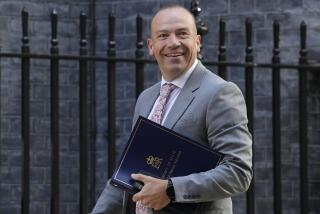Clemency for 6 Convicted in IRA Bombings Is Refused
- Share via
LONDON — Six Irish prisoners serving life sentences for the worst terrorist attack on the British mainland were refused clemency Friday after losing an appeal of their convictions, a move that caused widespread dismay on both sides of the Irish Sea.
Home Secretary Douglas Hurd told Parliament in writing that he had decided against exercising the Royal Prerogative of Mercy, whereby governments can free convicts despite court rulings.
The six can ask permission to appeal to the Law Lords of the House of Lords, England’s highest court, and ultimately take their case to the European Court of Human Rights.
Thursday’s verdict climaxed a five-week court battle that has made the six a cause celebre among a wide spectrum of British and Irish politicians, former ministers and churchmen who believe they are innocent of the bombings of two taverns in Birmingham on Nov. 21, 1974, that killed 21 people and injured 162 in the worst Irish Republican Army attack on mainland Britain.
The outlawed IRA, which is seeking to drive the British out of Northern Ireland, claimed responsibility for the attack, denied that the six men arrested were involved.
The six are Patrick Hill, Hugh Callaghan, John Walker, Richard McIlkenny, Gerry Hunter, and William Power.
Beating Claim Rejected
The three-judge appeals court rejected the defense argument that police beat the men into confessing and that forensic evidence that they had handled explosives was faulty.
The request for clemency came from John Farr, a lawmaker from Hurd’s governing Conservative Party, and it was Hurd who ordered the case reopened after 13 years because he believed new information merited a possible retrial.
The ruling threatened to worsen Anglo-Irish relations, which suffered a blow Monday when the British attorney general announced there would be no prosecutions of Northern Ireland policemen involved in the case of an alleged shoot-to-kill policy against Irish guerrillas.
The Irish government expressed “great regret and disappointment” at the verdict and said it continued to believe that “there may have been a miscarriage of justice.”
“I am amazed and very saddened,” said Irish Justice Minister Gerry Collins. “A very wide volume of opinion believes these people are innocent.”
Protest at British Embassy
About 30 people demonstrated outside the British Embassy in Dublin, calling for the repeal of the new Anglo-Irish extradition treaty enacted last month, which facilitates the transfer of terrorism suspects to Britain.
Irish commentators expressed fears Friday that the court ruling, plus the decision not to prosecute the policemen over the shoot-to-kill case, could jeopardize the 1985 Anglo-Irish accord that gives Dublin a say in Northern Ireland affairs
Central to the accord is a promise to reform the Northern Ireland police force, which was tarnished by the deaths of five unarmed guerrillas and an innocent teen-ager in separate police shooting incidents in the early 1980s.
On Monday, Atty. Gen. Patrick Mayhew announced that although there was evidence of attempts to subvert justice following the shootings, prosecutions would be against the public interest. He did not elaborate.
Justice Minister Collins said the decision played into the hands of the IRA.
Speaking on British Broadcasting Corp. radio, Collins claimed “the British attorney general has given a new lease of life to the IRA.”
More to Read
Sign up for Essential California
The most important California stories and recommendations in your inbox every morning.
You may occasionally receive promotional content from the Los Angeles Times.













